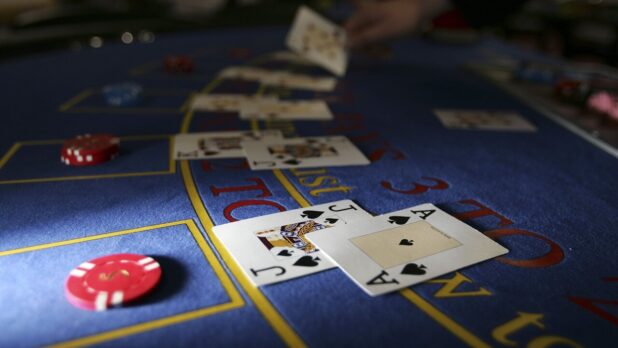In the world of glitz and glamor, casinos stand as towering monuments of entertainment and risk. However, beneath their shimmering lights lies a deep understanding of human psychology. This blog post ventures into the intricate ways casinos predict and influence human behavior. From the allure of the jackpot to the design of the gaming floor, everything in a casino is meticulously orchestrated to maximize customer engagement and profitability.
As gambling continues to be a major economic and leisure activity globally, understanding these strategies becomes increasingly relevant when you play on MMC996. This exploration is not just for those who love the roll of the dice but for anyone interested in the clever interplay of human behavior and business strategy.

Table of Contents
The Science of Casino Design
The architecture of a casino is a study of psychological manipulation. Everything from the carpet patterns to the ceiling height is designed to create an environment that captivates. Bright, pulsating lights and warm colors create an inviting and thrilling atmosphere, while the labyrinth-like layout, often devoid of clocks and windows, disorients and encourages guests to forget time.
Even the specific sounds from slot machines are crafted to stimulate excitement and anticipation. This meticulous design is aimed at creating a space where reality fades and the allure of gambling takes center stage, encouraging guests to stay longer and spend more.
Psychology of Gambling
Gambling’s allure can be traced back to deep psychological triggers. The ‘gambler’s fallacy‘, for instance, is a cognitive bias where players believe past events influence future outcomes, leading them to expect a win after a string of losses.
Similarly, the ‘near-miss effect’ elicits a significant emotional response when players almost win, fueling the false hope of imminent success and urging them to try again. These psychological hooks, combined with the thrill of risk and the lure of potential rewards, create a potent mix that can keep players at the tables for extended periods, often beyond their intended time and budget.

Data Analytics in Casinos
Modern casinos such as online Casino Malaysia are bastions of data analytics. By collecting data on every aspect of player behavior, from game preferences to spending patterns, casinos can tailor experiences to individual tastes and maximize profits.
Loyalty cards, a common tool in this data collection, track players’ habits and preferences, enabling casinos to customize incentives and promotions. These analytics also help casinos identify trends, adjust game offerings, and develop marketing strategies that resonate with different demographics. This data-driven approach not only enhances customer experiences but also sharpens the casino’s competitive edge.
Slot Machines and RNGs
Slot machines, the backbone of many casinos, operate on Random Number Generators (RNGs). These sophisticated algorithms ensure that each spin is an independent event, making predictions and patterns impossible.
Despite their random nature, casinos finely tune these machines to control odds and payout frequencies, balancing the need to offer attractive wins to players while ensuring their long-term profitability. The mystery and unpredictability of slot machines, combined with the possibility of instant wealth, make them irresistibly attractive to many gamblers.
Table Games and Probability
Table games like blackjack and roulette are underpinned by the immutable laws of mathematics. Understanding the probability and statistics behind these games is crucial for both players and casinos. The house edge, a built-in advantage that ensures the casino’s profitability over time, varies across games.
While players may employ strategies to maximize their chances of winning, the odds are ultimately aligned in the casino’s favor. This delicate balance between chance, skill, and statistical inevitability makes table games both challenging and enticing to those seeking to beat the odds.

Behavioral Economics in Casinos
Casinos masterfully apply principles of behavioral economics to exploit cognitive biases and influence decision-making. By understanding how individuals deviate from rationality, especially under conditions of uncertainty and risk, casinos can design environments and game features that subtly nudge players towards behaviors that increase spending.
From the placement of games to the rewards structure, every aspect is optimized to play on emotions and biases such as loss aversion and overconfidence. This sophisticated understanding of human psychology allows casinos to subtly manipulate player behavior in their favor.
Complimentary Services and Reinforcement
Casinos excel in the art of reinforcement through complimentary services. Free drinks, hotel stays, and other perks are not just acts of hospitality; they are calculated strategies to keep players engaged and feeling valued. This sense of receiving ‘something for nothing’ can create a psychological obligation, encouraging longer play and increased loyalty.
Additionally, these services work as a form of positive reinforcement, rewarding players for their patronage and subtly encouraging continued gambling. The effectiveness of these strategies is evident in the enduring popularity of loyalty programs and VIP services in casinos worldwide.
Surveillance and Security
In the high-stakes world of casinos, extensive surveillance, and robust security measures are paramount. These systems serve dual purposes: protecting the casino’s assets from cheating and fraud, and ensuring a safe, fair environment for patrons.
State-of-the-art surveillance technology, including facial recognition and AI-driven monitoring systems, tracks every corner of the casino floor. Security teams are trained to spot suspicious behavior and potential threats, maintaining the integrity of the games and the safety of guests. This vigilant approach to security not only deters criminal activity but also reinforces the casino’s reputation as a secure and trustworthy establishment.

Responsible Gambling Measures
As awareness of gambling addiction grows, responsible gambling practices have become increasingly important. Casinos now offer a range of measures to promote responsible gaming, including self-exclusion programs, limits on betting amounts, and information on gambling risks.
These initiatives reflect a growing recognition of the social responsibilities of gambling establishments and aim to mitigate the potential harms associated with gambling. By providing resources and support for those at risk of addiction, casinos contribute to a safer, more ethical gambling environment.
Casino Regulation and Fairness
The integrity and fairness of casino operations are maintained through stringent regulation and oversight. Gaming commissions and independent auditing bodies play a crucial role in ensuring compliance with legal standards and fair play.
These entities monitor everything from game fairness and RNG accuracy to financial transactions and anti-money laundering practices. Regular audits and inspections ensure that casinos operate transparently and responsibly, maintaining public trust and providing a level playing field for all players.
Conclusion
Understanding the strategies and psychology behind casino operations is not just about unraveling the allure of gambling; it’s about appreciating the complex interplay between business, psychology, and technology. Casinos are more than just places of leisure; they are sophisticated enterprises that masterfully navigate the human psyche.
As we continue to witness the evolution of gambling practices, the importance of responsible gambling and ethical operations cannot be overstated. This journey into the casino mind offers valuable insights, not just for players and industry professionals, but for anyone interested in the nuanced dynamics of human behavior and decision-making.
 World Magazine 2024
World Magazine 2024






